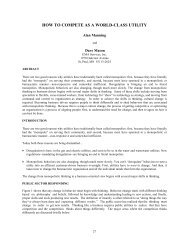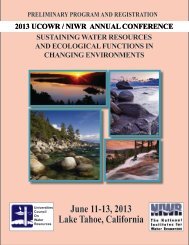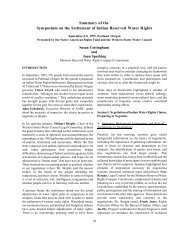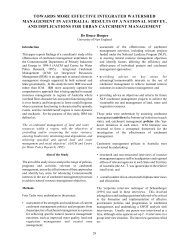64Genskow <strong>and</strong> BornWashington, DC.Korfmacher, K. S. 2000. What’s the point <strong>of</strong> partnering?A case study <strong>of</strong> ecosystem management in the DarbyCreek <strong>Water</strong>shed. American Behavioral Scientist44(4): 548-564.Leach, W. D. 2000. Surveying diverse stakeholdergroups. Society <strong>and</strong> Natural Resources 15(7): 641-649.Leach, W. D., <strong>and</strong> N. W. Pelkey., 2001. Makingwatershed partnerships work: A review <strong>of</strong> theempirical literature. <strong>Journal</strong> <strong>of</strong> <strong>Water</strong> ResourcesPlanning <strong>and</strong> Management 127(6): 378-385.Leach, W. D., N. W. Pelkey, <strong>and</strong> P. A. Sabatier,2002. Stakeholder partnerships as collaborativepolicymaking: Evaluation criteria applied towatershed management in California <strong>and</strong> Washington.<strong>Journal</strong> <strong>of</strong> Policy Analysis <strong>and</strong> Management 21(4):645-670.Leach, W. D <strong>and</strong> P. A. Sabatier, 2005. Are trust <strong>and</strong>social capital the keys to success? <strong>Water</strong>shedpartnerships in California <strong>and</strong> Washington. Pages233-258 In Sabatier, P.A., W. Focht, M. Lubell, Z.Trachtenberg, A. Vedlitz, <strong>and</strong> M. Matlock (Eds.)Swimming Upstream: Collaborative Approaches to<strong>Water</strong>shed Management. MIT Press: Cambridge,Masachusetts.Lubell, M., M. S. Schneider, J. T. Scholz, <strong>and</strong> M. Mete.2002. <strong>Water</strong>shed partnerships <strong>and</strong> the emergence <strong>of</strong>collective action institutions. American <strong>Journal</strong> <strong>of</strong>Political Science 46(1): 148-163.Lubell, M, P.A. Sabatier, A. Vedlitz, W. Focht, Z.Trachtenberg, <strong>and</strong> M. Matlock. 2005. Conclusions<strong>and</strong> Recommendations. Pages 261-296 In Pages 233-258 In Sabatier, Paul A <strong>and</strong> others (Editors). 2005.Swimming Upstream: Collaborative Approaches to<strong>Water</strong>shed Management. MIT Press: Cambridge,Massachusetts.MacKenzie, S. H. 1996. Integrated Resources Planning:The Ecosystem Approach in the Great Lakes Basin.Isl<strong>and</strong> Press: Washington, D.C.Margerum, R. D. 2002. Evaluating collaborativeplanning: Implications from an empirical analysis<strong>of</strong> growth management. <strong>Journal</strong> <strong>of</strong> the AmericanPlanning Association 68(2): 179-193.Margerum, R. D. <strong>and</strong> S. M. Born. 2000. A co-ordinationdiagnostic for improved integrated environmentalmanagement. <strong>Journal</strong> <strong>of</strong> Environmental Planning<strong>and</strong> Management 43(1): 5-21.McCloskey, M. 1996. The skeptic: Collaboration hasits limits. High Country News 28(9): 7.Moore, E. A. <strong>and</strong> T. M. Koontz. 2003. A typology<strong>of</strong> collaborative watershed groups: Citizen-based,agency-based, <strong>and</strong> mixed partnerships. Society <strong>and</strong>Natural Resources 16: 451-460.Mullin, M. W. <strong>and</strong> B. E. Allison. 1999. Stakeholderinvolvement <strong>and</strong> social capital: Keys to watershedmanagement success in Alabama. <strong>Journal</strong> <strong>of</strong> theAmerican <strong>Water</strong> Resources Association 35(3): 655-662.National <strong>Research</strong> Council. 1999. New Strategiesfor America’s <strong>Water</strong>sheds. Washington: NationalAcademy Press.Putnam, R. 2000. Bowling Alone: The Collapse <strong>and</strong>Revival <strong>of</strong> American Community. Touchstone/Simon& Shuster: New York.Sabatier, P. A., W. Focht, M. Lubell, Z. Trachtenberg,A. Vedlitz, <strong>and</strong> M. Matlock (Eds). 2005.Swimming Upstream: Collaborative Approaches to<strong>Water</strong>shed Management. MIT Press: Cambridge,Massachusetts.Selin, S. <strong>and</strong> D. Chavez. 1995. Developing acollaborative model for environmental planning <strong>and</strong>management. Environmental Management 19(2):189-195.Selman, P. 2001. Social capital, sustainability <strong>and</strong>environmental planning. Planning Theory <strong>and</strong>Practice 2(1): 13-30.Walker, P. A. <strong>and</strong> P. T. Hurley. 2004. Collaborationderailed: The politics <strong>of</strong> “community-based”resource management in Nevada County. Society<strong>and</strong> Natural Resources 17: 735-751.Weber, E. P. 2000. A new vanguard for the environment:Grass-roots ecosystem management as a newenvironmental movement. Society <strong>and</strong> NaturalResources 13: 237-259.Woolley J. T. <strong>and</strong> M. V. McGinnis. 1999. The politics<strong>of</strong> watershed policy making. Policy Studies <strong>Journal</strong>27 (3): 578-594.UCOWRJOURNAL OF CONTEMPORARY WATER RESEARCH & EDUCATION
65UNIVERSITIES COUNCIL ON WATER RESOURCESJOURNAL OF CONTEMPORARY WATER RESEARCH & EDUCATIONISSUE 135, PAGES 65-73, DECEMBER 2006Implementing the <strong>Water</strong> Framework Directive:How to Define a “Competent Authority”Colin Green 1 <strong>and</strong> Amalia Fernández-Bilbao 21 Flood Hazard <strong>Research</strong> Centre, Middlesex University, UK; 2 Collingwood Environmental Planning, London, UKThe European Union (EU) <strong>Water</strong> FrameworkDirective (WFD) has the overall objective<strong>of</strong> achieving good ecological status for allwater bodies by 2015. It is up to the individualMember States to designate a “CompetentAuthority” that will be responsible for preparing<strong>and</strong> implementing River Basin Management Plansfor each River Basin District, that is, the new unit<strong>of</strong> management <strong>of</strong> water resources introduced bythe directive.In addition to environmental st<strong>and</strong>ards, the<strong>Water</strong> Framework Directive requires publicparticipation <strong>and</strong> cost recovery from primarywater uses, including environmental costs, aspart <strong>of</strong> the River Basin process. The requirementsfor public participation in the <strong>Water</strong> FrameworkDirective are not as strong as those contained inthe Aarhus Convention (United Nations EconomicCommission for Europe 1998) which requirespublic participation in environmental matters tobe guaranteed. Active involvement is only to be“encouraged” according to Article 14 <strong>of</strong> the <strong>Water</strong>Framework Directive (European Commission2000).If stakeholder engagement is to be meaningful,it has to include defining priorities. This is inconflict with both economic analysis, whichclaims to be able to determine not only appropriatepriorities but also the optimal outcome, <strong>and</strong> alsowith the fixed st<strong>and</strong>ards defined by the directive.Economic analysis claims to be able to determinewhat the optimum water quality st<strong>and</strong>ards are <strong>and</strong>this also conflicts with the fixed st<strong>and</strong>ards in theDirective (Green 2003). The <strong>Water</strong> FrameworkDirective consequently embodies a series <strong>of</strong>internal contradictions that had already becomeapparent during the development phase <strong>of</strong> the text(Kaika 2003).In an attempt to solve these contradictions,the final text <strong>of</strong> the directive introduces scope forexceptions <strong>and</strong> derogations. Member States areallowed to take into account the local geographical<strong>and</strong> climatic conditions as well as economic,social, <strong>and</strong> environmental impacts <strong>of</strong> full pricingpolicies (European Commission 2000). There isalso the option <strong>of</strong> not applying full cost recoveryto a specific water use (Lanz <strong>and</strong> Scheuer 2001)<strong>and</strong> under Article 4.4, the deadlines to achievethe environmental objectives can be extendedto a maximum <strong>of</strong> two updates <strong>of</strong> the river basinmanagement plan, that is 12 years, as the plansmust be updated every 6 years. The directivegives a list <strong>of</strong> reasons such as technical feasibility,disproportionate costs, <strong>and</strong> natural conditions.Hence, the key principles to improve the state <strong>of</strong>Europe’s waters are also the source <strong>of</strong> importantcontradictions that may cause the implementation<strong>of</strong> the <strong>Water</strong> Framework Directive to become anendless process <strong>of</strong> obtaining derogations <strong>and</strong>exceptions, which may result in the relaxation <strong>of</strong>the targets defined in the directive.Successful implementation <strong>of</strong> the <strong>Water</strong>Framework Directive could be measured ultimatelyin terms <strong>of</strong> achieving the environmental objectives<strong>and</strong> avoiding delays <strong>and</strong> relaxation <strong>of</strong> thosetargets. We argue that in order to be successful,the institution chosen to carry out the RiverBasin Planning (RBP) process needs to be able toinfluence other key stakeholders. The competentauthority will also have to provide a forum inwhich to involve all the stakeholders relevant toriver basin planning.JOURNAL OF CONTEMPORARY WATER RESEARCH & EDUCATIONUCOWR
- Page 3:
Journal of ContemporaryWater Resear
- Page 6 and 7:
2Bruce Hooperinstitutional, and tem
- Page 11 and 12:
IWRM: Governance, Best Practice, an
- Page 13 and 14:
IWRM: Defi nitions and Conceptual M
- Page 15 and 16:
IWRM: Defi nitions and Conceptual M
- Page 17 and 18: IWRM: Defi nitions and Conceptual M
- Page 19: IWRM: Defi nitions and Conceptual M
- Page 22 and 23: 18Cardwell. Cole, Cartwright, and M
- Page 24 and 25: 20Mostert26 water boards responsibl
- Page 26 and 27: 22MostertTable 1. Third National Wa
- Page 28 and 29: 24MostertImplementationThe ambitiou
- Page 30 and 31: 26MostertBiswas, A. K. 2004b. Respo
- Page 32 and 33: 28UNIVERSITIES COUNCIL ON WATER RES
- Page 34 and 35: 30Ashton, Turton, and Rouxresource
- Page 36 and 37: 32Ashton, Turton, and Rouxassumptio
- Page 38 and 39: 34Ashton, Turton, and RouxEffective
- Page 40 and 41: 36UNIVERSITIES COUNCIL ON WATER RES
- Page 42 and 43: 38Hussey and Doversin water policy
- Page 44 and 45: 40Hussey and Dovers1994 Council of
- Page 46 and 47: 42Hussey and Doversestablished Thes
- Page 48 and 49: 44Hussey and DoversTable 1. Typolog
- Page 50 and 51: 46Hussey and Doversassessment appro
- Page 52 and 53: 48Hussey and Doverspolicy goals.Bey
- Page 54 and 55: 50Hussey and DoversFrawley, K. 1994
- Page 56 and 57: 52Mitchelloften took three to four
- Page 58 and 59: 54Mitchelltree preservation plans;
- Page 60 and 61: 56UNIVERSITIES COUNCIL ON WATER RES
- Page 62 and 63: 58Genskow and Borna series of chall
- Page 64 and 65: 60Genskow and BornTable 1. Watershe
- Page 66 and 67: 62Genskow and Bornthe first Dungene
- Page 70 and 71: 66Green and Fernández-BilbaoWithin
- Page 72 and 73: 68Green and Fernández-Bilbaosubjec
- Page 74 and 75: 70Green and Fernández-Bilbaoinflue
- Page 76 and 77: 72Green and Fernández-BilbaoBerbel
- Page 78 and 79: 74UNIVERSITIES COUNCIL ON WATER RES
- Page 80 and 81: 76BallweberEstablish AdvisoryCommit
- Page 82 and 83: 78Ballweberattributes in others (Ch
- Page 84 and 85: 80UNIVERSITIES COUNCIL ON WATER RES
- Page 86 and 87: 82Barreiraand ground water. To this
- Page 88 and 89: 84Barreirawith other states for int
- Page 90 and 91: 86UNIVERSITIES COUNCIL ON WATER RES
- Page 92 and 93: 88Davis and ThrelfallResource Manag
- Page 94 and 95: 90Davis and ThrelfallTable 2. Thirt
- Page 96 and 97: 92Davis and Threlfallby regional an
- Page 98 and 99: 94Davis and Threlfallenforcement, a
- Page 100 and 101: 96Davis and Threlfallhusbandry prac
- Page 102 and 103: 98Davis and ThrelfallNew Zealand: T
- Page 104 and 105: 100UNIVERSITIES COUNCIL ON WATER RE
- Page 106 and 107: 102Lamoree and van SteenbergenIt is
- Page 108 and 109: 104Lamoree and van Steenbergenand n
- Page 110 and 111: 106Lamoree and van Steenbergeninter
- Page 112 and 113: 108BourgetWorks Planner Capability
- Page 114 and 115: 110Bourgetwith over 600 people resp
- Page 116 and 117: 112Bourgetgovernment’s intrusion
- Page 118 and 119:
114Bourget4.management, drought man
- Page 120 and 121:
116McKayFigure 1. The four paradigm
- Page 122 and 123:
118McKay4. Paradigm 4 (which commen
- Page 124 and 125:
120McKaythree main functions:1. ass
- Page 126 and 127:
122McKayState Implementation of the
- Page 128 and 129:
124McKayTable 2. Corporate governan
- Page 130 and 131:
126McKayFigure 4. Qu. 26 - The ESD
- Page 132 and 133:
128McKayFigure 7. Qu.93- This organ
- Page 134 and 135:
130McKayBrundtland Report. 1987. Ou
- Page 136 and 137:
132UCOWR BOARD OF DIRECTORS/COMMITT
- Page 138 and 139:
134BENEFITS OF UCOWR MEMBERSHIPThe
- Page 140 and 141:
136Past Issues of the Journal of Co
- Page 142 and 143:
138Academic Organizations Membershi
- Page 144 and 145:
140Individual Membership Applicatio
- Page 146 and 147:
Universities Council on Water Resou
- Page 148:
Integrated Water Resources Manageme








